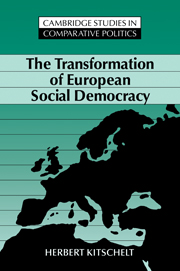Book contents
- Frontmatter
- Contents
- List of tables and figures
- Preface
- Glossary of political parties by country
- Introduction
- 1 Social structure and collective preference formation: Opportunities for left party strategy in the 1970s and 1980s
- 2 Class structure and left party performance
- 3 Political economy and left party fortunes
- 4 Social democratic strategy and electoral competition
- 5 Internal politics in socialist parties: Preference formation, aggregation, and strategic choice
- 6 The socialist discourse: Political semantics and party strategy
- 7 Social democracy in decline? Analytical and normative extensions of the argument
- References
- Index
3 - Political economy and left party fortunes
Published online by Cambridge University Press: 08 January 2010
- Frontmatter
- Contents
- List of tables and figures
- Preface
- Glossary of political parties by country
- Introduction
- 1 Social structure and collective preference formation: Opportunities for left party strategy in the 1970s and 1980s
- 2 Class structure and left party performance
- 3 Political economy and left party fortunes
- 4 Social democratic strategy and electoral competition
- 5 Internal politics in socialist parties: Preference formation, aggregation, and strategic choice
- 6 The socialist discourse: Political semantics and party strategy
- 7 Social democracy in decline? Analytical and normative extensions of the argument
- References
- Index
Summary
Even though the change of class structure, conceived in conventional terms of economic property rights, does not, by itself, account for the electoral fortunes of socialist parties, left parties are exposed to elementary social and economic forces by running for and holding office. These forces may shape their political fortunes. First, the mere fact that a party heads the government, regardless of specific government policies and policy outcomes, may subject it to a particular responsibility for a variety of social developments in the eyes of the voters. Government incumbency endows a party with vulnerabilities vis-à-vis competitors that may affect its subsequent electoral performance. Second, a governing party's achievements in economic and social policy-making may shape the electorate's voting intentions. Institutional features of government formation and authority may intensify or reduce the electorate's awareness of government policy and willingness to attribute policy outcomes to party actions. Third, the electoral fortunes of governing parties may also depend on political-economic institutions, such as the organization of interest intermediation in economic policy-making between business, labor, and the government and the scope and design of welfare states. Such institutions affect citizens' trust in the long-term feasibility of a party's general economic policy approach and citizens' economic self-interests.
In a brief formula, three social and institutional conditions may be hypothesized to help social democratic parties in the electoral competition.
- Type
- Chapter
- Information
- The Transformation of European Social Democracy , pp. 67 - 111Publisher: Cambridge University PressPrint publication year: 1994

